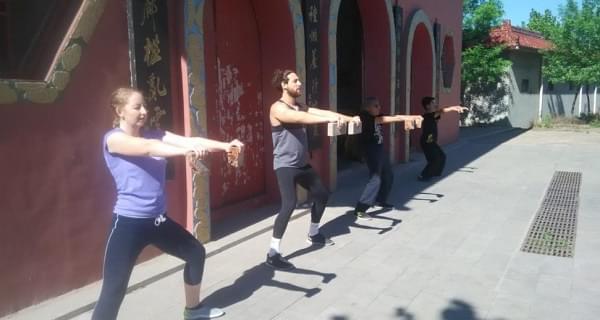5 Reasons Why You Should Consider Studying Martial Arts in China
China is home to numerous of ancient martial arts disciplines from Kung Fu to Tai Chi, so what better way to study these arts than by traveling to the place they originated from? It isn’t unheard of for foreigners to venture to China in pursuit of studying martial arts. There are endless amounts of benefits to reap from doing so. This list covers merely a few of the advantages you can gain.
1. Location is Everything

Image credit to learn-shaolinkungfu.com
There is no shortage of places to go in China if your full focus is studying the fighting arts. Take a trip to Hebei, for instance. It’s a popular location for martial arts. There, you can find the Taizu Mountain Shaolin Kung Fu Academy. It accepts students from around the world taught by authentic Shaolin monks. Check them out if you’re interested in learning more.
Several other locations across the country work just as well. In China’s capital, Beijing, you can find many fellow foreign practitioners on similar learning journeys. In addition, you get a great taste of Chinese culture.
2. Experience a Different Culture
Speaking of culture, it’s yet another great advantage to learning martial arts in the country. You get to experience culture in a way you never have before. There’s about 5,000 years worth of it to explore. Even better, due to its large size and population, China is highly multicultural and diverse. You may not find the same practices being followed from one end of the country to the other.
Embark on the typical tour most foreigners do, mingle with the locals in the shopping districts, or check out the incredible nightlight scene. You’ll never run out of things to explore. Be aware, however, that culture clashes can happen. It’s best to learn about any taboos and common traditions beforehand to prevent offending anyone.
3. Immerse in Martial Arts History

Image credit to pixabay.com (user tervelch)
Visiting China not only gives you perfect locations to train at, but it also gives you the chance to experience the history of the fighting arts up close and personal. Any fan of Chinese martial arts is aware of the Shaolin Temple. Located in Henan, the monastery is a sacred place for enthusiasts and practitioners from around the world. The heavy tourist action it sees from everyday people to celebrities and politicians is a testament to that. The commercial success is not without controversy. However, there’s no denying the historic significance it’s held for centuries.
There are many other ways to dive into history. It’s in abundance in Shanghai at the Chinese Martial Arts Museum. The place is a great, informative, and kid-friendly venue that features several interactive exhibits.
4. Learn a New Language

Image credit to pixabay.com (user PublicDomainPictures)
Living in another country without being fluent in the language seems daunting at first. Rest assured: immersing yourself in the culture in order to learn can be a rewarding experience. If you’re practicing martial arts in a school, many places even offer language lessons. Becoming bilingual is beneficial in its own right from helping you function easier while living in China to opening new doors professionally.
5. Improve Your Mental and Physical Self

Image credit to pixabay.com (user Chermano)
It’s evident that practicing martial arts alone come with many benefits such as reduced stress, physical conditioning, etc. Studying in China comes with added advantages that only an instructor can give. More than likely, you will be practicing long hours from early morning to afternoon. This can help instill a greater amount of discipline you lacked beforehand. Physically, your endurance will improve as instructors push you to improve your skills, to not give up even in the most grueling training sessions.
As touched on before, China is home to many famed martial arts styles, and visiting the historic birth places of the fighting arts comes with a host of benefits. It may seem intimidating at first, but do believe that taking the plunge will be worth it.
About the Author:
Jason Maine is the founder of FullContactWay, a blog dedicated to provide best martial arts advice and information. Jason helps his readers with martial arts training by sharing personal tips and thorough research. Check out fullcontactway.com to get more about Jason’s work. You can find him on Facebook, Pinterest or Twitter.”


